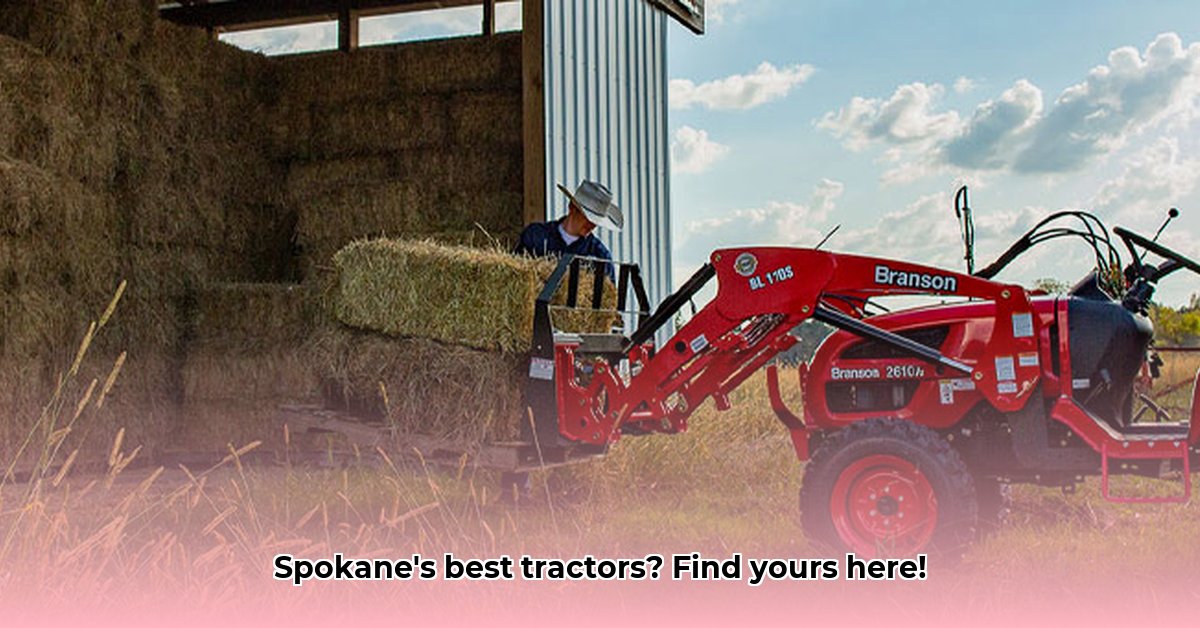
Cascade Tractor Spokane: A Case Study in Sustainable Agriculture Accessibility
Finding the right tractor is crucial for Spokane farmers, especially those prioritizing sustainable farming practices. Cascade Tractor Supply (CTS) offers a wide range of equipment, but its direct contribution to environmental sustainability requires closer examination. This case study explores CTS's role, highlighting its strengths and areas for improvement. How does CTS, in practice, impact the sustainability goals of Spokane's agricultural community?
Access to Equipment: Leveling the Playing Field
CTS provides access to a diverse selection of new and used tractors and equipment, catering to farms of all sizes and budgets. This accessibility is a significant factor in promoting sustainable farming. Smaller, resource-conscious operations might not afford top-tier equipment; CTS offers an entry point, enabling them to adopt more efficient and potentially less environmentally damaging methods. This affordability directly contrasts with the often high capital costs associated with sustainable technologies, creating a pathway for wider adoption. Does this broadened access translate to a measurable increase in sustainable farming practices across Spokane?
The Missing Link: Transparency and Sustainability Metrics
While CTS's accessibility is a strength, its commitment to sustainability lacks explicit transparency. Its website and marketing materials don't readily highlight fuel efficiency, emission levels, or other environmental considerations of its equipment. This lack of information hinders a complete assessment of CTS’s environmental impact. Are there any industry benchmarks regarding the transparency of sustainability reporting in agricultural equipment sales? This data gap impedes broader understanding of whether CTS's business model inadvertently supports environmentally conscious farming.
Recommendations for a Greener Future
CTS can significantly enhance its contribution to sustainable agriculture through several key initiatives:
Comprehensive Sustainability Audit: Conduct a thorough review of all equipment, analyzing fuel consumption, emissions, and manufacturing materials to establish a firm baseline environmental impact. This audit should produce quantifiable data for future reporting and improvement targets. Following this, establish a clear timeframe for implementing changes and achieving measurable improvements.
Enhanced Transparency in Marketing and Sales: Make readily available—on the website and sales materials—fuel efficiency and emission data for all equipment. Use clear, comparable metrics to empower customer choices based on environmental impact. A 90-day target for full implementation could achieve high visibility and customer confidence.
Strategic Partnerships with Sustainable Agriculture Organizations: Collaborate with local and national groups focused on sustainable agriculture. This collaboration facilitates access to cutting-edge technology, best practices, and training for both CTS employees and clients. A 6-month project plan would streamline the collaboration and ensure successful integration.
A Collaborative Approach: The Shared Responsibility
Sustainable farming requires a collaborative effort involving farmers, communities, and policymakers:
Farmers: Utilize available government grants and subsidies for eco-friendly equipment and practices. Actively seek information on sustainable techniques. This proactive approach will ensure broader adoption of sustainable practices.
Community: Support local initiatives promoting sustainable agriculture. Advocate for policies incentivizing environmentally conscious farming. This creates a positive feedback loop promoting sustainability at the community level.
Policymakers: Implement policies and incentives rewarding fuel-efficient and low-emission equipment. Develop regulations promoting sustainable land management and reducing the environmental impact of agriculture. Government funding can be crucial in driving change.
How to Find Sustainable Farming Equipment Grants Near Spokane
Locating grants for sustainable farming equipment near Spokane requires targeted research and a strategic approach. While the Washington State Department of Agriculture (WSDA) offers various agricultural grants, many focus on broader practices, not equipment specifically. https://agr.wa.gov/services/grant-opportunities A multi-pronged approach is necessary.
A Strategic Grant Search Strategy
- Comprehensive Research: Thoroughly research state, regional, and local grant opportunities.
- Targeted Applications: Prioritize grants aligning with specific equipment needs and sustainability goals.
- Compelling Application: Clearly articulate the environmental and economic benefits of proposed projects.
- Feedback and Refinement: Seek expert review before submitting applications.
- Follow Up: Proactively monitor application status and follow up with providers.
By fostering transparency, engaging in strategic partnerships, and collaborating across sectors, Cascade Tractor Supply can significantly enhance its role in supporting the transition to sustainable agriculture in Spokane, Washington. The future of farming hinges on this collaborative effort.